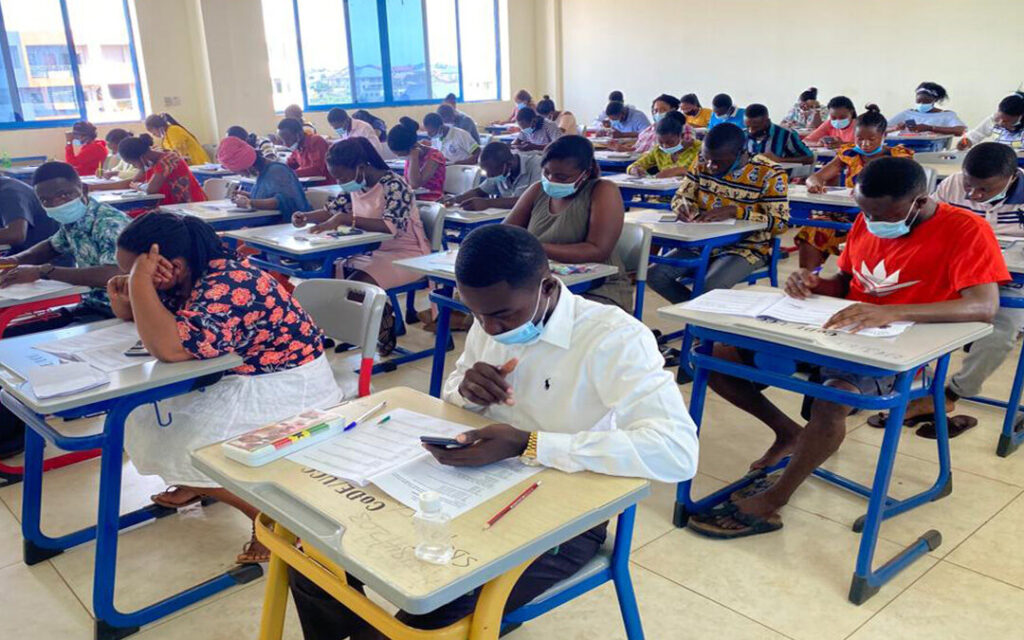
All the studying areas for the newly introduced Subject-based papers (Content and Pedagogy) have been detailed to aid learning for the forthcoming NTC Licensure exams.
NTC GTLE 2024 content and scope for all courses across the forty-six (46) accredited Colleges of Education in Ghana.
As communicated, the NTC GTLE will be written in three (3) separate papers. They are: General paper which comprises Literacy, Numeracy, and Essential skills. Next, Elective area paper (Contents & methods/pedagogy in your elective area).
There are reading materials on General paper which comprise Literacy, Numeracy, and Essential skills available here
The next examinable area, the Elective paper (Contents & methods/pedagogy in your elective area) also has areas to focus on in the document below.
CHECK 👉🏿September 2023 NTC Licensure exam centres
The document has the classification of test items, course objectives/outcomes (Depth of knowledge), competencies, descriptive statements, and areas of focus for the NTC exams.
Kindly download it here👇🏿
Elective paper (Contents & methods/pedagogy in your elective area)
Content and pedagogy areas for Primary have also been covered in the document.
PEDAGOGY CONTENT FOR SECONDARY (JHS/SHS) EDUCATION
- The concepts – methodology, pedagogy, andragogy, heutagogy (self-determined learning)
- Types of pedagogy (teacher-centred, learner-centred, learning-centred)
- SHS Pedagogy examples (discussion, demonstration, simulation, and factors to consider in selecting a pedagogy/method = topic, students’ characteristics, class environment – class size, instructional materials available, etc.
- Curriculum/syllabus – concept, nature, and evaluation
- Scheme of work/Learning Scheme
- Factors to consider when designing the learning scheme
- Sequencing topics
- Lesson Plan
- Why design a lesson plan
- Factors to consider when designing a lesson plan
- Components of the lesson plan
- Writing learning outcomes, indicators/objectives
- Core and transferable skills (21st Century Skills)
- Classroom Management (challenges of creating a conducive classroom environment,
space, and time and addressing the challenges) - Questioning
- Error correction in the classroom
- TLMs/Instructional Resources including ICT tools (preparation and use)
- Assessment (writing effective test items and scoring)
COMPETENCIES
A. Demonstrate knowledge and understanding of the concept of pedagogy and provide examples.
- Differentiate between the concepts of pedagogy and andragogy.
- Identify the various types of pedagogy.
- Identify factors to consider in selecting a pedagogy/method for teaching at the secondary (JHS & SHS) school level.
- Explain how the various methods (Eg. Discussion, Fieldwork, Lecture, etc.) can be
applied in the classroom.
B. Demonstrate knowledge and understanding of the concept, nature, and evaluation of the secondary (JHS & SHS) school curriculum
- Explain the concept of curriculum.
- Explain the types and characteristics of curriculum.
- Identify deficiencies, if any, in the secondary school (JHS & SHS) curriculum
C. Demonstrate knowledge and understanding of the scheme of work
- Define the concept, scheme of work.
- Identify the major components of a scheme of work.
- Determine the factors to consider when designing a scheme of work.
- Examine ways of sequencing topics in the scheme of work.
D. Understand lesson plan and its preparation processes
- Explain the importance of designing a lesson plan.
- Examine the factors to consider when designing a lesson plan.
- Discuss the major components of a lesson plan.
- Write appropriate learning outcomes and indicators for a lesson.
E. Demonstrate knowledge and understanding of 21st-century skills and apply them in teaching
- Identify the 21st-century skills in teaching.
- Explain the various 21st-century skills in teaching.
- Use appropriate pedagogy to achieve the various 21st-century skills in teaching.
F. Understand and use effective classroom management practices to enhance teaching and learning at the secondary (JHS & SHS) school
- Identify techniques and strategies for classroom management.
- Determine various ways of arranging the classroom for effective lesson delivery.
- Use time effectively in the delivery of the lesson.
- Use appropriate techniques/strategies to manage large classes effectively.
G. Understand and use appropriate skills in lesson delivery
- Identify the types of questions used in teaching.
- Identify the various questioning skills used in teaching.
- Use the various question levels in the lesson delivery.
H. Knowledge and understanding of preparing and using instructional resources
- Explain, with relevant examples, instructional resources.
- Classify instructional resources based on specified criteria.
- Identify factors essential in the selection of instructional resources.
- Identify ways that ICT tools can be used to enhance teaching and learning in the
classroom. - Prepare and use instructional resources in lesson delivery.
- Evaluate the effectiveness of an instructional resource in lesson delivery.
I. Demonstrate an understanding of classroom assessment and its effective use
- Identify the rationale for classroom assessment.
- Identify the various forms of classroom assessment.
- Write effective/appropriate test items.
- Identify various ways of scoring a test.
- Analyse and use test scores to make a meaningful judgment.
Source: Blowgrade.com
